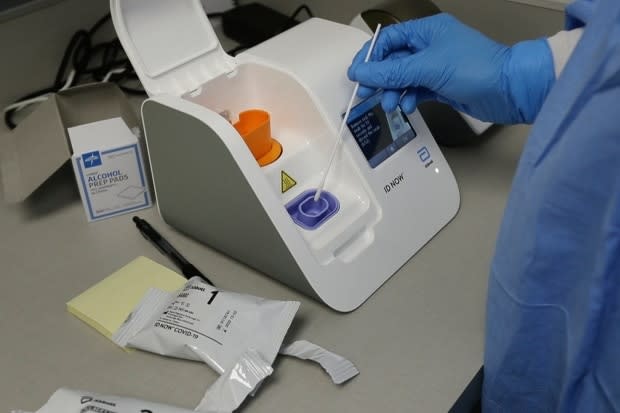Rapid testing could lead to reduced self-isolation times, says N.W.T.'s top doctor
A reduced period of self-isolation could be on the horizon for people entering the Northwest Territories, though its border restrictions are expected to continue for several more months, the territory's chief public health officer confirmed Wednesday afternoon.
Dr. Kami Kandola made the comments during a weekly press briefing. She noted that the recent federal approval of the rapid testing ID NOW machine, which could produce results in minutes without the need for a laboratory, is an important step in reducing turnaround for travellers entering the territory.
"What we're going to be doing is we're going to be modelling, and looking strategically to use this test to shorten the isolation time," Kandola said, promising more news to follow.
"We are reviewing the evidence of the relationship between testing periods and risk of transmission, to prepare to implement a new strategy when these technologies are available to use in Canada."

Kandola also said the government is looking at other options for self-isolation that would allow residents of the territory's communities to isolate at home. Currently, travellers entering or returning to the N.W.T. from anywhere besides Nunavut must isolate at hubs in Yellowknife, Fort Smith, Hay River, or Inuvik.
Acknowledging the impact isolating away from home can have on one's mental health, Kandola said she's "heard enough stories from people who have experienced anxiety and health concerns."
"We're listening to those stories and we need to make a balance of the risk of COVID[-19], and the risk of someone's well-being."
Kandola said the government is reviewing its protocols around isolation, noting that any plan for community isolation would only come after consultation with Indigenous governments.

Travel restrictions continuing for at least 6 months
However, while changes may be on the horizon for self-isolation protocols, the territory's border restrictions — in which only residents, people moving to the territory, and those exempted for work or compassionate reasons are allowed to travel within the territory — are not expected to change for the next half year.
Kandola confirmed that travel restrictions and the self-isolation order will be in place for "at least the next six months."
"Right now we're on the upswing of a second wave [in southern Canada]," said Kandola. "This is not the time to lower restrictions, I can say that with certainty."
Keeping the border restrictions in place, Kandola said, may allow the territory to keep its current phase two COVID-19 restrictions in place within them, even as larger provinces grapple with tightening their restrictions.
"If we continue to have this effect that we have right now … we can stay in phase two, even if the rest of Canada goes back a phase, even if the second wave continues. We can stay steady, even through Christmas."
New leader of COVID-19 enforcement
During the briefing, it was also announced that Conrad Baetz, a deputy chief public health officer who led the territory's COVID-19 enforcement task force, has retired as of Sept. 18.
The task force is now being led by Dennis Marchiori. Marchiori has worked with the task force since its establishment and is a former public safety director with the City of Yellowknife.

Introducing himself to media, Marchiori praised the territory's response to COVID-19 and the restrictions in place.
"The residents of the Northwest Territories have been very patient, they've been very good with all the staff we've set up for the COVID[-19] secretariat. The staff has also been very good, and I really appreciate that.
"We're all trying to build toward the same goal, and we're working at it as a team," he said.


